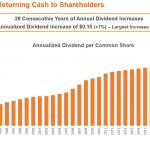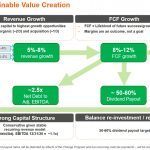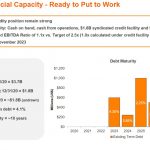Contents
Thomson Reuters Corporation (TRI) is a leading provider of business information services whose products include highly specialized information-enabled software and tools for legal, tax, accounting and compliance professionals.
The company is transitioning from a holding company to an operating company and from a content provider to a content-driven technology company. It has remapped its business units with a focus on bolstering the company's positions in the key Legal Professionals, Corporates, and Tax and Accounting Professionals growth segments (the 'Big 3').
Summary
- Thomson Reuters Corporation (TRI) released Q4 and FY2020 results and FY2021 - Fy2023 guidance on February 23, 2021.
- TRI's recently introduced two-year Change Program will transition the company from a holding company to an operating company and from a content provider to a content-driven technology company.
- I am prepared to be more liberal with the valuation metric I typically use to determine what is a reasonable level at which to acquire shares. I am not, however, prepared to immediately initiate a position even when I relax my valuation metric and am looking for TRI's share price to pull back to the level reflected herein.
NOTE: Thomson Reuters Corporation (TRI.to and TRI), listed on the Toronto Stock Exchange and the New York Stock Exchange, reports its results in USD. TRI's US listed share price is used for analysis purposes in this article.
Introduction
Acquiring attractively or reasonably valued shares in high quality companies in the current environment is challenging. Although several of my articles may cover companies where my analysis leads me to the conclusion that shares are overvalued/grossly overvalued, I choose to write about these companies so we can put them on our 'radar' in the hopes that the companies' valuation will retrace to an attractive level. TRI is one such high quality company where my analysis leads me to the conclusion that shares are currently overvalued.
TRI, formed in 2008 when the Thomson Corporation acquired Reuters, is a leading provider of business information services whose products include highly specialized information-enabled software and tools for legal, tax, accounting and compliance professionals.
The Woodbridge Company Limited, a Canadian private holding company based in Toronto, Ontario which is the primary investment vehicle for members of the family of the late Roy Thomson, controls ~ 66% of TRI shares. As at March 18, 2020, Forbes ranked David Thomson and family as the 24th wealthiest in the world with a net worth of $31.6B.
I have mentioned in previous articles that I am not concerned where a founder/founding family controls the voting rights. My reasoning is that the controlling investors very likely have a significant percentage of their net worth tied up in the company and a significant percentage of their income might also be generated from the company. As a result, they have a vested interest in the success of the business and likely approach their investment decisions with the very long-term in mind.
Business Overview
In a January 30, 2018 Press Release TRI indicated it was taking the first step in a radical transformation of the business when it announced that The Blackstone Group Inc. (BX) would acquire a 55% interest in Thomson Reuters Financial & Risk with TRI to retain a 45% stake; the company was rebranded as Refinitiv.
In July 2019, TRI, BX, and London Stock Exchange Group (LSEG) announced LSEG's intent to buy Refinitiv in an all-share transaction valuing the company at $27B. Regulatory approval to close the transaction was finally awarded by EU regulators in January 2021.
TRI remains a shareholder and a board member in Refinitiv and the pre-tax value of its 82.5 million shares is ~$11.2B or ~$23/share in TRI's stock price, up from $6.7B or $13/share in TRI's stock price at the time the sale to LSEG was announced in July 2019.
Looking at an 'Insider Roster' for LSEG, I see that York Holdings II, Ltd. holds ~80 million shares and York Holdings III, Ltd. holds ~32.34 million shares. The magnitude of these holdings suggests these holding companies are either Blackstone or TRI related. Unfortunately I am unable to confirm same.
The company is transitioning from a product-focused structure to a customer-focused structure and has remapped its business units with a focus on bolstering the company's positions in key growth segments; the first 3 of the following 5 reportable segments are the key growth segments.
- Legal Professionals
- Corporates
- Tax and Accounting Professionals
- Reuters News
- Global Print
A very comprehensive overview of TRI can be found commencing on page 4 of 206 in the 2019 Annual Report. The 7 Strategic Investment Priorities found page 15 of the February 23, 2021 Q4 and FY2020 Earnings Presentation provides additional information regarding TRI's transformation.
Q4 and FY2020 Results and FY2021 - FY2023 Guidance
On February 23, 2021 TRI released Q4 and FY2020 earnings and FY2021 guidance; details can be found here and the link to the accompanying Earnings Presentation can be found above.
As with many Balance Sheets I review, the assets reflected often include assets acquired several years ago at values well below the current value. Such is the case with TRI , and therefore, I am not alarmed that TRI's Total Liabilities as at FYE2020 of ~$8B is not that far off from Total Equity of $10B.
I also think there are hidden assets for which the value is not reflected on the Balance Sheet. Earlier in this article I indicated that TRI remains a shareholder and a board member in Refinitiv and the pre-tax value of its 82.5 million shares is ~$11.2B. This amount is reflected nowhere on the Balance Sheet.
On the conference call with analysts, senior management indicated TRI met or exceeded each of the financial guidance metrics that had been provided for 2020. This reflects the resilience of the business and visibility the company has into its businesses and markets. The company, however, has just announced its 'Accelerating To 3.0 - Change Program' after having undertaken a comprehensive review of its value proposition which is to enhance the customer experience and to maximize performance.
This program is being implemented from a position of strength. TRI operates in robust and growing legal, tax and risk, fraud and compliance markets and ranks #1 or #2 in the core legal, tax and accounting, corporates and risk, fraud and compliance franchises. The trends in these key markets play to TRI's strengths and will contribute to grow; the COVID pandemic has changed how, when, and where people work, and the TRI's key markets are healthy and growing and the competitive environments in which it operates are stable.
The desired outcome of the changes being undertaken are reflected in the following slide.
Source: TRI - Q4 and FY2020 Earnings Presentation - February 23, 2021
The change program is expected to take 24 months to largely complete and will require a ~$0.5B - ~$0.6B investment in 2021 and 2022. This investment is forecast to deliver additional annual revenue of ~$0.1B in 2023, annual operating expense savings of ~$0.6B of which ~$0.2B will be reinvested in growth initiatives for a net savings of ~$0.4B, and a reduction in capital spending as a percent of revenue between 6% - 6.5%.
In 2023, TRI has forecast total company organic revenue growth between 5 - 6%, 6% - 7% for the 'Big 3' (Legal Professionals, Corporates, and Tax and Accounting Professionals), and adjusted EBITDA margin in 2023 is expected to range between 38 - 40%.
Free cash flow per share is forecast to range between $3.60 - $4 in 2023 versus $2.67/share reported in FY2020.
By 2023, TRI expects to have essentially redesigned the customer experience to match customers expectations by delivering a seamless experience and enabling access to new customer groups, including small and medium size businesses.
TRI's ownership interest in LSEG also provides substantial possibilities to further strengthen its position and management has forecast that the company could have financial capacity of as much as $15B by 2025 thus allowing the company to assess options to further drive growth and shareholder value.
On a less positive note, TRI recently received notice we will have to pay the U.K. tax authorities $90 million in March 2021 related to an ongoing tax dispute. The company expects to receive additional notices in 2021 to pay as much as an additional $0.6B - $0.7B. The company is disputing the amounts but is required to pay these amounts upfront while it contest them. Proceeds to pay this disputed amount will come from the sale of $1B worth of the 82.5 million shares it holds from the sale of its Financial & Risk business (refer above LSEG and Refinitiv transaction). The net proceeds of $0.75B will be used this year to pay $0.7B in taxes and the large majority of these potential payments will be recorded in discontinued operations and will not impact TRI's free cash flow.
TRI's remaining equity interest in LSEG after the sale of $1B of shares represents a store of value which can be monetized over time and will provide TRI with a significant level of financial flexibility. The company expects to receive annual dividends from LSEG of about $75 million/year based on LSEG's current annual dividend payout.
From a liquidity perspective, TRI had $1.8B of cash on hand as at December 31, 2020, an undrawn $1.8B revolving credit facility, and a $1.8B commercial paper program. Management wishes to put this capital to work and there is a pipeline of potential acquisitions within its core markets.
Credit Ratings
Moody's rates TRI's senior long-term unsecured debt Baa2, S&P Global has assigned a BBB rating, and Fitch has assigned a BBB+ rating.
Moody's and S&P Global's ratings are comparable and are the middle tier of the lower medium grade. Fitch's rating is the top tier of the lower medium grade. These ratings are defined as an obligor having ADEQUATE capacity to meet its financial commitments but is somewhat more susceptible to the adverse effects of changes in circumstances and economic conditions than obligors in higher-rated categories.
The current ratings are investment grade and are satisfactory for my risk profile.
Looking at TRI's debt maturity schedule we see that it has ample financial capacity.
Source: TRI - Q4 and FY2020 Earnings Presentation - February 23, 2021
TRI's dividend history is contained in a spreadsheet which can be accessed here.
 Source: TRI - Q4 and FY2020 Earnings Presentation - February 23, 2021
Source: TRI - Q4 and FY2020 Earnings Presentation - February 23, 2021
On February 23, 2021 TRI announced that its Board of Directors approved a $0.10 per share annualized increase in the dividend to $1.62/share, representing the 28th consecutive year of dividend increases. A quarterly dividend of $0.405/share is payable on March 17, 2021 to common shareholders of record as of March 5, 2021. This new dividend is a ~6.57% increase from the prior $0.38 quarterly dividend and on the basis of the current ~$88 share price the forward dividend yield is ~1.8%.
TRI's dividend target payout is 50 - 60% of FCF. TRI's FY2021 FCF guidance, however, is $2.00 - $2.20/share so the new $1.62 annual dividend is ~77% of the mid-point of 2021 FCF guidance which is somewhat elevated.
If a ~6.6% annual dividend increase becomes the new normal then we are looking at ~$1.73 in FY2022 and ~$1.84 in FY2023. FCF guidance in these years is $2.40 - $2.60 in FY2022 and $3.60 - $4.00 in FY2023 which would mean (using the mid-point of the projected FCF ranges) a ~69% dividend/FCF in FY2022 and ~48% dividend/FCF in FY2023.
TRI also announced on February 23 that it recently completed the repurchase of $200 million of its common shares under its normal course issuer bid which began in January 2021. The company does not currently intend to repurchase additional shares in 2021 and a target has been set to maintain ~500 million common shares outstanding by using share repurchases to offset dilution associated with the company's dividend reinvestment and equity incentive plans.
Looking at a report which reflect the 'Latest Filings Over the Past 12 Months' I see that TRI acquired shares on several different trading days in January 2021 in the following price ranges (~$79 - ~$83 and ~$100 CDN - ~$105 CDN).
Valuation
TRI has changed dramatically in recent years, and continues to go through a radical transformation, to the point where comparing the company's current valuation and valuation based on projections against results prior to 2019 is ill-advised.
In FY2020, TRI generated diluted EPS of $2.25 from continuing operations. With shares trading at ~$88 we get a diluted PE of ~39.
The FY2021 Adjusted EPS guidance range from 21 brokers is $1.68 - $2.21 with a mean of $1.79. Using $1.79 and the current share price we get an adjusted diluted PE of ~49.
Looking at TRI's valuation on the basis of FCF/share we see that TRI generates $2.67 in FCF in FY2020 so on the basis of a ~$88 share price the P/FCF is ~33. Management has provided FY2021 FCF guidance of $2.00 - $2.20/share, $2.40 - $2.60 in FY2022, and $3.60 - $4.00 in FY2023. If we use a generous P/FCF valuation of 25 and the $2.10 mid-point of FY2021 FCF guidance then a price of ~$52.5 seems more reasonable. Applying the same valuation metric for FY2022 and FY2023 and the mid-point of FCF guidance for those years we get a P/FCF of ~$62.5 in FY2022 and ~$95 in FY2023.
Looking at TRI at face value it appears shares are currently significantly overvalued. We need to recognize, however, that there are a lot of moving parts. Strictly adhering to a rigorous 15 - 20 PE range using FY2021 broker estimates and management guidance would result in such a low 'buy at' share price that it would likely take another Financial Crisis for that 'buy at' share price to be reached! For example, a 20 PE and $3 of EPS, which is greater than guidance, would suggest a $60 share price is appropriate.
In my opinion, we need to look at where TRI expects to be once TRI completes its transformation come FY2023. My sources show that only 9 brokers have provided adjusted diluted EPS guidance for 2023 with a range of $2.92 - $3.60 and a mean of $3.17. TRI is transforming itself into a higher growth business so I will take the liberty of stretching the PE level I would be prepared to accept to initiate a position in TRI. Using a ~25 PE and FY2023 adjusted diluted EPS of $3.17, I would be prepared to pay ~$80 or less (~$100 CDN or less) to acquire TRI shares which is comparable to what TRI paid to acquire $200 million of its common shares under its normal course issuer bid in January 2021. If you take the ~$200 million TRI spent to acquire shares and an average purchase price of $81/share then the company repurchase just under 2.5 million shares. That is a drop in the bucket considering TRI wants to maintain ~500 million common shares outstanding so I am not making any adjustment to account for all the shares purchased in January.
Final Thoughts
While some investors might be reluctant to invest in a company where the large majority of the voting shares is controlled by 'insiders', I have absolutely no problem with this if I see that the 'insiders' have a track record of creating long-term shareholder value and are not using 'their' company solely as a 'piggy bank' to finance their lavish lifestyle. This certainly does not appear to be the case with the Thomson family. They clearly know how to create wealth so I would like to 'piggy back' on their ability to do so.
I recognize the price at which I am prepared to acquire TRI shares might be a bit rich based on FY2020 earnings and FCF and FY2021 guidance but this is a company which is in the early stages of a transformation which should make it a higher growth business that generates strong earnings and FCF. There is always a risk to relying on future earnings expectations to value a company but in this case we are only going out a couple of years into the future to come up with what appears to be a reasonable entry level.
I am not prepared to initiate a TRI position at the current ~$88 share price but a decline to ~$80 or less (~$100 CDN or less), which is in the ballpark of what TRI paid to acquire shares in January, would prompt me to very seriously consider initiating a position unless I identify an even more attractive investment opportunity; this might include increasing my position in existing holdings.
I wish you much success on your journey to financial freedom.
Thanks for reading!
Note: I sincerely appreciate the time you took to read this article. Please send any feedback, corrections, or questions to [email protected].
Disclaimer: I have no knowledge of your individual circumstances and am not providing individualized advice or recommendations. I encourage you not to make any investment decision without conducting your own research and due diligence. You should also consult your financial advisor about your specific situation.
Disclosure: I do not currently hold a position in TRI and do not intend to initiate a position within the next 72 hours.
I wrote this article myself and it expresses my own opinions. I am not receiving compensation for it and have no business relationship with any company whose stock is mentioned in this article.




